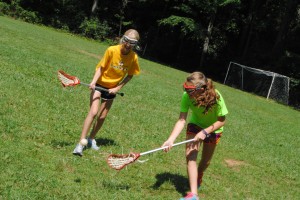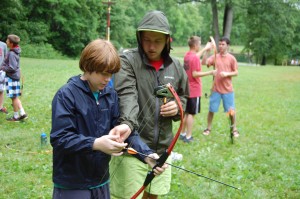Winners or Losers?
Posted by Sharon I learned some amazing lessons about life when I was a starting forward on the worst basketball team in the history of the world. We were a sloppy group of pre-pubescent sixth and seventh graders who took to the gym floor on Friday nights in the ugliest uniforms you’ve ever seen. With “St. Mark’s” emblazoned in road cone orange across the front of our jet black polyester jerseys, our hearty band of clumsy wannabes would begin warm-ups hoping “tonight’s the night we’ll win our first one.” We never allowed the fact that we had difficulty putting the ball through the hoop during the pre-game lay-up drill to shatter our dream.
I learned some amazing lessons about life when I was a starting forward on the worst basketball team in the history of the world. We were a sloppy group of pre-pubescent sixth and seventh graders who took to the gym floor on Friday nights in the ugliest uniforms you’ve ever seen. With “St. Mark’s” emblazoned in road cone orange across the front of our jet black polyester jerseys, our hearty band of clumsy wannabes would begin warm-ups hoping “tonight’s the night we’ll win our first one.” We never allowed the fact that we had difficulty putting the ball through the hoop during the pre-game lay-up drill to shatter our dream.
But the dream that refused to die never materialized as we showed up each week to play in a church youth league where every team but ours was manned by towering muscle-bound high school seniors and juniors. For two seasons, we never gained control of the ball on the opening tip-off. In fact, it seemed like we never had the ball. And when the final buzzer sounded, we never walked off with the scoreboard tilted in our favor. No team ever scored less than 100 points against us. Our scrappy team never scored more than 12 points in a game. In my entire two year basketball career, I poured in a whopping two points.
Do you know why I smile fondly as I remember that experience? Because it was fun. Our coach and parents never yelled. They always encouraged. They never made us feel like losers. If and when we scored, the entire place, would erupt with a cheer. Because of that, I can remember every detail of the one basket I made. I’ve forgotten my dozens of shots that missed. When the game was over, we always smiled. Playing for St. Mark’s taught me a lot about attitude, character, and the fact that basketball is only a game.
In the years since my days of basketball “glory”, I’ve had the opportunity to spend a chunk of time coaching teams and watching my own kids play organized sports. I’ve never taken my teams to a world championship nor are the odds great for my kids or any of their teammates to make a living playing games. Yet I wonder why the sidelines, stands, and team benches are peppered, sometimes covered, with parents and coaches who pressure and push their kids with a “succeed at all costs” attitude. These parents and coaches bully kids right out of childhood into the overwhelming frustration of a burned out “I have failed” existence. I must admit, there are times when I’m tempted to go with the flow of these attitudes. Have you ever felt the need to push a little bit harder so your kid’s not left in the dust?
Vincent Fortanasce is a psychiatrist, coach and member of the Little League Hall of Fame. In his book, Life Lessons from Little League (Doubleday), he relates how he asked parent’s at the initial team meeting about what they first ask their children after a game, if they had not been able to attend. The most common question was “Did you win today?” The second most frequent question was “How did you do?” Fortanasce writes, “What was my point? Simply that I wanted my team parents to re-focus away from ‘I want my child to learn to win,’ or the pursuit of perfection, to the pursuit of contentment and confidence; from ‘I want my child to be the best player on the best team’ – the pursuit of talent – to ‘I want my child to be a good sportsman’ – the pursuit of character.” He suggests that the more appropriate questions are “Did you have fun?” or “What did you learn today?”
Plato said, “You can learn more about a person in an hour of play than you can in a lifetime of conversation.” A twist on Plato’s words ring true today: we can learn quite a bit about a parent in a few minutes of observing them watch their own child play. What do you see when you look in the mirror? As you evaluate the role you play in the lives of the kids you parent and/or coach, consider these questions:
Who’s out on the field? Unfortunately, some parents see their kids as a second chance to fulfill dreams they themselves never realized. Best selling recording artist Alanis Morrisette’s gripping song Perfect echoes the experience of too many kids: “I’ll live through you, I’ll make you what I never was/If you’re the best, then maybe so am I. . . you’ll make up for what I blew/what’s the problem. . . why are you crying?”
What’s on your mind? Mark understood when his talented 17-year-old son Travis asked to quit playing ice hockey. The win-at-all costs mind set of his coaches and teammates’ parents had finally gotten to be too much for Travis. Mark says that in youth sports today “the child’s welfare is becoming less and less important. The focus should be on instruction and developing character. But you wonder about some of the coaches and parents today . . . the bottom-line is that I never saw Travis smile when he played. . . I supported his decision 100 percent.” As a result of their decision, Travis Howe won’t be the third generation of the Gordie Howe family to play in the uniform of the National Hockey League’s Detroit Red Wings. For the Howe’s, character won out over winning.
What’s in your heart? Are the desires of your heart to see your child do his/her best. Or, is your heart set on a standard or level of achievement that is impossible for your child to attain. When sports psychologist Rick Wolff worked for the Cleveland Indians, he was surprised to discover that there were a large number of major league ball players who didn’t allow their kids to get involved in Little League baseball. The reason: the pressure on kids to excel beyond their ability and potential. Instead, they encouraged their kids to skateboard, ski, or anything else to keep them from the unnecessary pressure placed on youth league baseball players. After all, it’s only a game . . . and they’re only kids! Let them play and have fun!
What’s coming out of your mouth? “Frustrated parents . . . can attack the umpires, berate the managers and coaches, and demean the players on the field with impunity”, writes Fortanasce. “Some go the full hundred yards in criticizing their children’s teammates – and even their own children.” I’ve watched young kids cower and teenagers become bitter in response. And even if they do respond with improved performance, are those critical attitudes qualities that we want to nurture in our kids? Children learn from example. If we’re going to scream anything, it should be words of praise, encouragement, and acceptance.
In this day and age of increased activity, it’s realistic to assume that most kids will spend some time during their childhood in a uniform participating in some kind of organized sport. Hopefully, you and I will be on the sideline cheering them on. It would be a good idea for all of us sports parents to pinch ourselves and come back to reality. We’d realize that there’s a greater chance of getting hit by lightning than of our child growing up to sport a world series ring, wear the Olympic gold, or skate around holding the Stanley Cup.
Our children will grow up with memories of their childhood sporting experience. Those memories will be either positive, or negative.
I look back on my role as a player on the world’s worst basketball team with a smile on my face. Why? Because it was awesome. When the dust settled, I know that I came away from that “losing” experience as a real winner. Nobody screamed . . . nobody pushed . . . nobody lived their dreams through me. I hope my kids will be able to someday look back and do the same. How about you?
by Walt Mueller
The Center for Parent/Youth Understanding
Posted in Just For Parents | Tagged Camp Crestridge, Camp Ridgecrest, Just for Parents, Loser, parent articles, Ridgecrest Summer Camps, Sports, The Center for Parent/Youth Understanding, Winner | Leave a reply
The best ways to pray with children
Posted by Phil Recently in the prayer class I lead at our church in Oklahoma City, I was explaining to the new children why we take one Sunday a month from their regular lessons to focus on prayer. “We want you to know God, not just know about Him, and hear God, not just hear about Him,” I explained.
Recently in the prayer class I lead at our church in Oklahoma City, I was explaining to the new children why we take one Sunday a month from their regular lessons to focus on prayer. “We want you to know God, not just know about Him, and hear God, not just hear about Him,” I explained.
Eight-year-old Andrew, who has been in prayer class for several years, piped up to help get the idea across: “It’s like me and President Bush. I’ve seen him on TV lots of times, especially since 9-11, and read about him in the newspaper, and heard my parents talking about him. But I have never had a conversation with President Bush, so I don’t really know him, do I?”
Andrew was exactly right. If we want our children to know God and not just know about Him, we need to teach them to pray and pray with them. Children could do all kinds of worksheets about God and hear stories about Him, but it is when they talk and listen to God that they begin to know His heart.
Children need to know early in their lives that they can talk to God just like they talk to Mommy, Daddy, or a best friend. They need to understand that God is there and attentive to what they have to say. Instead of putting them on hold or playing a recorded message, God is always willing to listen – whether they are on the playground, at a friend’s house, in the car, or at church.
You can pray …
Heart to heart – Share with your child a time that you prayed and received the answer in a surprising or dramatic way.
On the spot – The next time your child comes to you with a problem or worry, instead of saying, “I will pray for you,” do it right then. Even if it is a short prayer, you will be demonstrating the important principle that God wants us to cast the care of all our concerns on Him and pray about everything.
Through the newspaper – Pass out sections of the newspaper and ask each child to come up with one concern to pray about.
Modeling: How to learn prayer
One of the first ways children learn the importance of prayer is hearing their moms and dads pray. Since Josh was born, his dad would pray for him each night at bedtime, asking for God’s protection and love to fill his heart. When Josh turned 2 years old, his parents added a short nightly reading from his Bible. Shortly after age 2, Josh began to join in by looking around his room and naming everything he could see to thank God for – blankets, puppy, Mommy, Daddy, new shoes, toys, the nightlight, eyes, ears, nose. He thanked God for the most interesting items! But it was not only Josh that was growing spiritually. Hearing her son’s simple prayers, Josh’s mom, Sandy, could not remember the last time she thanked God for her sight, hearing, shoes, clothes, and all the other blessings in her life.
Get out of the ruts of prayer
One way to banish the “nothing to pray for” or “prayer is boring” complaint is to get out of the ruts of prayer by using prayer targets and making prayer active. Use a game I call “Musical Prayers.” Place a chair for each participant in a circle. Tape a prayer target to each chair. Begin playing music and have everyone walk around the chairs. When the music stops, each person finds the nearest chair and prays for that need.
Use an inflatable world globe and pass it from person to person. When the music stops, the person holding the globe can choose a country and pray for the children in that country to know about Jesus.
Take your children on a prayer walk. Children are terrific prayer walkers because they enjoy movement and being “on site” makes the prayers more meaningful and concrete. To begin, walk around your neighborhood and ask God’s blessing and salvation on each family. Pray for the children in each home.
Give children the freedom to talk to God in different postures: sitting, standing, kneeling, marching, or bowing. When you have family prayer time, allow each person to choose a different posture in which to pray.
Pray a blessing
Praying a prayer of blessing on your child’s life each night at bedtime (or other times of the day) can bring comfort, reassurance, and hope to your child’s heart. Pray for God’s favor, protection, and peace. Thank the Lord for something specific – a gift, talent, or quality in your child. You can use a Bible blessing such as Psalm 5:12 or Numbers 6:25 or speak from your heart. When you pray scriptural blessings, you are speaking words that match God’s desire for your child.
Thanksgiving
An essential part of prayer is simply saying, “Thank You, God.”
Blessing basket – Fill a small basket with little slips of paper. Encourage family members to write or draw pictures of things for which they are thankful.
Best part of the day – Ask each child to say a sentence prayer, thanking God for the best part of her day.
Family journal – Keep a notebook full of things for which the family is thankful.
As you try different ways of connecting with God, children will learn that prayer is one of the greatest adventures in life – to call on the God of the universe and then to hear from Him. As Jeremiah 33:3 says: “Call to Me and I will answer you and tell you great and wondrous things you do not know.”
by Cheri Fuller on Tuesday, September 27, 2005
Posted in Just For Parents | Tagged Camp Crestridge, Camp Parents, Camp Ridgecrest, parent articles, Ridgecrest Summer Camps | Leave a reply
Conversation Starters: Choose to Change
Posted by Philmake the decision to follow God’s ways
Conversation Starters
How can you keep this conversation going at home? Try bouncing some of these questions around at the dinner table, as you’re driving your kids to school or an activity, or even while you’re shopping together:
For Preschoolers
Show me things in this room that are the most special to you. Why do you love that toy/book/person so much? Can you guess what is most special to me in this room? Guess what’s most special to God in this room. (Use this discussion to emphasize that your child is God’s special possession.)
For School-Age
Does it seem like kids who misbehave get most of the attention in school? How does that make you feel? Is it worth it to keep behaving and doing your work even when you don’t always get noticed and rewarded? Why? (Point out from Malachi 3:16 that God takes notice when they do the right thing.)
For Students
How much contact do you have with other Christians during the week? When do you get a chance to talk about God? How do you and your Christian friends support one another to keep living for God?
Posted in Just For Parents | Tagged Camp Crestridge, Camp Ridgecrest, Conversation Starters, Malachi 3:13–4:6, Ridgecrest Summer Camps | Leave a reply
Answering Tough Questions from Kids about God
Posted by Phil “Hey, Mom?” my son said one day. “If killing is wrong, then why did God help David kill Goliath?” Whoa! My child was only 3 years old! I was not expecting questions like this for at least seven more years. Over the next few weeks, he asked even more questions, such as “If Jesus is God’s Son, then who is God’s wife?” and “So Jesus and God are kind of the same but kind of different. How does that work?
“Hey, Mom?” my son said one day. “If killing is wrong, then why did God help David kill Goliath?” Whoa! My child was only 3 years old! I was not expecting questions like this for at least seven more years. Over the next few weeks, he asked even more questions, such as “If Jesus is God’s Son, then who is God’s wife?” and “So Jesus and God are kind of the same but kind of different. How does that work?
Children are curious. Like it or not, you are going to be faced with tough questions from little seekers. At times, it can be overwhelming. After all, theologians and scholars have been debating the answers to some of these questions for centuries, so how can you be expected to know the answers and communicate them to children in a way that makes sense? The next time you find yourself stumped by a child’s question, keep the following guidelines in mind.
Encourage children to ask questions
When you feel you do not have the time or energy to get into difficult questions, it is tempting to reply with a quick, “That’s just the way it is” or “Because God said so.” But resist the temptation to be flippant or to blurt out responses that ultimately discourage children from asking questions. Children are genuinely curious about their world, and we need to create an environment that encourages them to seek the truth. When you do, you foster a lifelong desire to continue learning more about God.
Communicate at the child’s level
When answering a child’s tough questions about God, always take into consideration his age and maturity level. Use words and concepts that he can understand and that do not cause additional confusion. This may mean that at times you simplify an issue, such as the Trinity or Christ’s incarnation, to its most basic facts.
Do not be afraid to say you do not know the answer
Instead, join the child in discovering the answer to his questions. Feel free to say: “I’ll have to look that up and get back to you” or “I’m not sure how to answer that. Let’s find the answer together.” It is beneficial for children to see that you are not a supreme know-it-all but that you, too, are still learning about God and growing in your understanding of spiritual concepts.
Help an older child look up answers himself
Pointing children to resources available to them lays the foundation for a lifetime of seeking answers to the hard questions. Stock your bookshelf with a good Bible dictionary and commentary. Show the child how to look up the answer and discuss it with him.
Pray for spiritual understanding
A child’s understanding of spiritual matters is primarily influenced by the Holy Spirit. The Bible makes it clear that the concepts relating to God and His ways are not always easy to understand. Pray that the child’s spiritual eyes, as well as your own, will be opened to God’s truths.
My son is now 7 years old and the questions keep coming! But rather than feel frustrated, I look forward to hearing what he asks next, and I am excited to watch him learn even more about God.
by Katrina Baker on Tuesday, September 26, 2006
Posted in Just For Parents | Tagged Camp Crestridge, Camp Ridgecrest, Just for Parents, parent resources, Ridgecrest Summer Camps | Leave a reply
Is Santa Real?
Posted by Sharon I personally do not have children but I do have 3 nieces and 2 nephews who I love like my own children. I could talk your ear off about them, but this is not my chance to do that! I’ve realized that my brothers and sister-in-laws get to teach them everything in the early years of their children’s’ lives. For the first several years, they get to determine what their children believe in, what is true, and what will become tradition.
I personally do not have children but I do have 3 nieces and 2 nephews who I love like my own children. I could talk your ear off about them, but this is not my chance to do that! I’ve realized that my brothers and sister-in-laws get to teach them everything in the early years of their children’s’ lives. For the first several years, they get to determine what their children believe in, what is true, and what will become tradition.
One of those traditions that is upon us in this Christmas season is Santa Claus. As a parent, you’ve probably heard the question, “Is Santa Real?” When I was younger, I believed in Santa. My parents still sign their name on presents as Santa. At Crestridge, we celebrate Christmas in the summertime and Santa Claus comes to visit. It’s fun and magical. I recently read an interesting article by Mark Driscoll that talks about how to talk to your kids about Santa. I’m sure it is exciting, yet difficult to decide what your approach will be on instances like this; what you are going to teach your children. There is no one way to parenting but I’d like to pose a few questions:
How do you talk to your kids about Santa?
What personal Christmas traditions do you see as most important to pass on to your children?
Besides giving a present to a family member, what is something you are currently doing or can do to teach your kids about a giving spirit?
Here’s an article I’d like to pass on by Mark Driscoll that is a possible approach in how to talk to your kids about Santa…
http://onfaith.washingtonpost.com/onfaith/panelists/mark_driscoll/2010/12/what_we_tell_our_kids_about_santa.html
We hope you have a wonderful time celebrating Christmas and Christ’s birth with your children!
Sharon Aylestock
Assistant Director, Camp Crestridge for Girls
Posted in Just For Parents | Tagged Camp Crestridge, Camp Ridgecrest, Christmas, Christmas Tradition, Mark Driscoll, Ridgecrest Summer Camps, Santa Claus, Tradition | Leave a reply
Video: Raising Radical Kids!
Posted by PhilParents! As we continue to partner with you as you raise your children, we are always on the lookout for solid resources and encouragement from some of the most godly fathers and sons that we know. We hope that you enjoy this 5 minute video with some really great ideas…
Posted in Just For Parents | Tagged Camp Crestridge, Camp Ridgecrest, LifeWay, parent resources, Parenting Teenagers, Raising Radical Kids!, Ridgecrest Summer Camps | Leave a reply
Conversation Starters: Recognize God’s Gift
Posted by Phil John 1:1-4,10-18
John 1:1-4,10-18
[Jesus is completely God, completely man, and completely necessary]
How can you keep this conversation going at home? Try bouncing some of these questions
around at the dinner table, as you’re driving your kids to school or an activity, or even
while you’re shopping together:
For Preschoolers
• Give each family member an opportunity to discuss their all-time favorite Christmas gift.
What made that gift special? Who gave you that gift?
For School-Age
• Your school-aged child may have a hard time realizing that the baby Jesus we emphasize
so much at Christmas grew up just like we do. Use the Scripture references from the feature
on page 9 to talk with your child about the humanity of Jesus.
• When you picture Jesus, do you picture Him as a baby in the manger, teaching and doing
miracles, or on the cross?
For Students
• When you look at a lot of other religions, they don’t believe that Jesus is truly God. Why do
you think it matters?
Posted in Just For Parents | Tagged Camp Ridgecrest, Cmap Crestridge, Conversation Starters, parent resourses, Ridgecrest Summer Camps | Leave a reply
Conversation Starter: Objection – Frustrating the Father
Posted by PhilConsidering How We Treat God
Conversation Starters
How can you keep this conversation going at home? Try bouncing some of these questions around at the dinner table, as you’re driving your kids to school or an activity, or even while you’re shopping together:
For Preschoolers
How big is God? How can we show a big, big God that we love Him?
You may want to tell about Jesus feeding a big crowd with the lunch that the little boy gave Him. Emphasize that God likes to use gifts from little children to help people. Helping other people and giving money to our church are two ways we can show God we love Him.
For School-Age
Do you ever see kids mistreating their teachers or parents?
How do you feel about that?
Do you think we ever treat God badly like that?
What are ways we can treat God with respect and show Him we love Him?
For Students
If you can catch them in the car without their earbuds in, play Waiting for the World to Change by John Mayer. Draw attention to a phrase such as “It’s hard to beat the system when we’re standing at a distance. So we keep waiting, waiting on the world to change.” Discuss questions such as: Should we wait on the world to change or go do something about it? If you could change one thing in this world, what would you? What can we as a family do to change our corner of the world and make life better for someone else?
Posted in Just For Parents | Tagged Camp Ridgecrest, Conversation Starters, LifeWay, Malachi 2:17–3:12, Ridgercest Summer Camps | Leave a reply
Traditions – at Camp… and at Home!
Posted by Phil At Ridgecrest Summer Camps, we have a lot of great traditions that have been ongoing since the 1930’s. One of them, at Camp Ridgecrest, is singing “Tell Me Why”. Our old brochures indicate that this has been happening for well over 80 years! At Crestridge, our Council of Progress ceremony has been ongoing since camp started in 1955!
At Ridgecrest Summer Camps, we have a lot of great traditions that have been ongoing since the 1930’s. One of them, at Camp Ridgecrest, is singing “Tell Me Why”. Our old brochures indicate that this has been happening for well over 80 years! At Crestridge, our Council of Progress ceremony has been ongoing since camp started in 1955!
Songs, ceremonies, and other traditions are an important part of camp… and also of families! They provide a familiarity, a “down home” feeling, a connectedness between the past and the present. Traditions help to make us more comfortable.
Are you making sure your family has traditions? I remember as a child, one of our family traditions was to go to the Dairy Queen every Sunday afternoon after Sunday lunch. We loved the soft serve ice cream, which you couldn’t get just anywhere at the time. I remember one time my dad letting us get Parfaits in the conical plastic glass cup, which I believe at the time cost 25 cents! That was quite a treat, as we usually were allowed only the ice cream cone which was 10 cents. Am I showing my age?
Another family tradition we had was praying before each meal around the table. You might think that everyone does that, but I don’t believe that happens as much these days as it used to.
Are you providing family traditions for your family? Maybe you visit the park or do a nature walk with your children on a given schedule. Maybe you set aside a time for family devotions. Maybe a tradition started when you were a child has carried over to your family now that you are the parent. Whatever your traditions might be, find some that work for your family, and keep those traditions. It will help your family stay better connected, both now and in the future!
Ron Springs
Camps Director
Ridgecrest Summer Camps
November 2012
Posted in Just For Parents | Tagged Camp Crestridge, Camp Ridgecrest, Jusr for Parents, parent resources, Ridgecrest Summer Camps, Ron Springs | Leave a reply
Six Summer Olympics Lessons for You and Your Kids
Posted by Phil This past summer, while your kids weren’t at camp, I’m sure lots of you huddles around the TV to watch some of the greatest athletes in the world…
This past summer, while your kids weren’t at camp, I’m sure lots of you huddles around the TV to watch some of the greatest athletes in the world…
“As you enjoy[ed] the adrenalin-charged competition, [did you] remind your kids about the years of determination, discipline, and sacrifice that shaped these athletes into champions. Want to know how they got where they are today? We asked two Olympic gold medalists to reflect on the life lessons their own families taught them – lessons you can pass on to your kids today.
Going the distance
A broken home. Rebellious teen years. A dangerous violent streak. Bryan Clay faced these obstacles and more on his way to the 2004 silver medal and the 2008 Olympic gold medal in the decathlon, which he hopes to defend at the 2012 Olympic Games in London. Looking back, the husband to Sarah and father of a 2-, 4-, and 6-year-old says he could have ended up in prison or worse. But through the persistent prayers of Bryan’s mother, who insisted he go out for track and field in middle school, Bryan found a new passion.
“As I entered high school, she repeatedly told me: ‘God’s got a plan for your life. He’s got something special in your future. I know it,'” Bryan recalls.
Bryan eventually dedicated himself to the decathlon, but he still faced obstacles despite wins in high school and college. His height and weight were below average for a decathlete, and his scores fell short of qualifying for the Olympic Trials. Bryan had committed his life to Christ but still struggled with partying and bad choices. However, he managed to stay focused on Olympic gold – thanks to his family in Christ.
“I had people in my life, a support system,” Bryan explains. “Isaac Newton has a quote: ‘If I have seen further it is only by standing on the shoulders of giants.’ People like my mom, wife, and coach have been the giants in my life. They raise me up and swallow their pride, and sacrifice to see me succeed. God intended for us to be in community. Success in life and faith is all about the people you surround yourselves with – accountability partners, people to encourage you.”
Today, Bryan, 32, relies on God and his family for strength to help him perform well. He hopes to become the first decathlete to medal in three Olympics. Bryan also prays for and encourages his own kids to embrace the faith and work ethic that changed his life.
“What I’ve learned from my mom is that parenting is one of the most important jobs in the world – it’s what shapes the beliefs and values in your kids,” Bryan says. “Though they may not understand or follow your lifestyle in the beginning, when they hit that time of need, they will come back.”
Three lessons I teach my kids
1. God first
“When I was in college, it was something they preached to us all the time,” Bryan says. “‘God first’ really has shaped the way I do things now. My priorities are God, family, and track, and everything else last. I hope our kids see that modeled and put God at the forefront of their lives.”
2. Always try your best – even when things come easily to you
“My son’s really gifted in academics; he’s a first grader reading at an eighth grade level,” Bryan shares. “But we try to teach him about always giving his best even though he might be able to get away with writing three sentences on his homework.”
It’s important to Bryan that he teaches his kids to strive for excellence rather than succumb to society’s pressure to be the best. “You simply give 100 percent in everything you do and let that be OK,” Bryan says.
3. Win and lose well
“Let your kids see how you handle winning and losing,” Bryan says. “I share a lot of my own real-life experiences … ‘Daddy does this, and this is how he deals with it.’ I don’t win every time I go out, but I always give my best effort and that’s what I’m proud of. That’s why God needs to be first, so we aren’t defined by our wins and losses.”
A perfect balance
Four-time Olympic medalist Shawn Johnson grew up in an ordinary family in suburban Iowa, taking fishing trips with her dad. And that down-to-earth upbringing was exactly what helped mold her into an extraordinary athlete.
“My parents are the type who never pushed me or made me go to practice,” Shawn, 20, says. “I never had the dad who said, ‘You can’t give up,’ or ‘You have to win.’ They were so supportive and wanted to be in the front row cheering me on no matter what I did.”
In elementary school, Shawn began taking lessons at Chow’s Gymnastics and Dance Institute. Gymnastics brought out her playful side and her love of adrenalin. Still, Shawn’s parents made sure her passion didn’t become her whole life.
“Mom and Dad talked freely with me about God,” Shawn says. “They taught me to look to God as a tremendous source of comfort and peace through all of life’s ups and downs. They encouraged me to talk with Him, and I know my mom regularly prayed for me.”
The road to elite competition was long, but by the time she was 13, Shawn had made the national gymnastics team and continued to climb to heights she never thought possible. She was named the 2007 all-around world champion and the 2007 and 2008 all-around U.S. champion. As a member of the 2008 U.S. women’s gymnastics team, she won an Olympic gold medal and three silver medals at the Beijing Olympics. She even won the eighth season of “Dancing With the Stars.” But in 2011, a ski injury to her knee threatened to end her promising career.
“What drove me to overcome my injury was the challenge in my mind of Can I?” Shawn relates. “I always loved the physical part of gymnastics, pushing yourself and proving the naysayers wrong. After the accident, I felt physically unfit and mentally unhealthy, but gymnastics helped push me into a better place and turn my life around.”
Shawn’s comeback on the gymnastics scene means she will once again compete for a spot on the 2012 Olympic team in London. But thanks to confidence from faith and family, she doesn’t feel overwhelming pressure to win.
“It’s almost impossible, and I want to prove to people that it’s possible,” Shawn says. “I don’t have anything else to prove, but what if I could go one step farther?”
Three lessons my parents taught me
1. Home is a safe place
Rather than use their home life to talk about gymnastics, Shawn’s parents gave her a welcomed time-out.
“My parents’ unconditional support led to my success because I had that backing and not the pressure that so many kids face every day,” Shawn says. “I had a place to go to get away from it – home. They made it a place I always wanted to come back to.”
2. Don’t be afraid to be different
“Growing up, you’re always trying to fit in with the popular crowd and do what everyone else is doing,” Shawn says. “My parents told me to be my own person and do what I loved even if it was different. That taught me to have confidence in myself and who I was instead of finding someone else to rely on.”
3. Your worth is not in winning
“It’s not about the medal or the placement. Your worth is not determined by that. Faith has a lot to do with it – you’re giving it your all, and no matter what the placement, you’re still proud. Too many kids get caught up in determining their success or worth in the color they’re wearing rather than what they’ve worked for.””
by Andrea Bailey Willits on Monday, June 25, 2012
Posted in Just For Parents | Tagged Camp Ridgecrest, Just for Parents, Ridgecrest Summer Camps | Leave a reply

